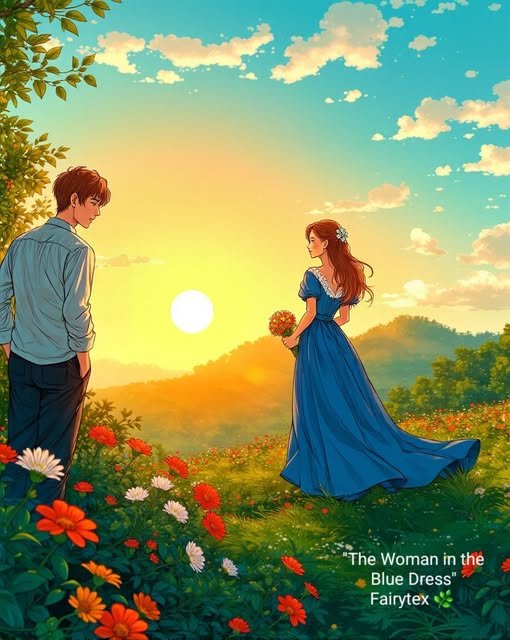A Cup of Cold Tea
In a quiet little house on the edge of town, Peony stood in her small kitchen, humming softly as she prepared tea.
The kitchen smelled of jasmine and warm bread. Outside, the late afternoon sun cast golden light through the lace curtains. The house was quiet except for the gentle clinking of porcelain as Peony carefully poured hot water into two cups.
She reached for the floral teapot, the one Harold had bought for her on their fiftieth wedding anniversary. The edges were worn, tiny cracks spreading like veins across the surface, but she handled it with care, as if it were made of gold.
“Harold, the tea is ready,” she called, her voice warm and expectant.
She placed the sugar bowl on the table, filled just the way he liked it—two teaspoons, no more, no less. She set his cup in front of his chair, the one with the tiny chip on the rim. Her hands, thin and veined, smoothed out the white tablecloth, just as she did every evening.
She sat down, resting her hands on the table, waiting.
Minutes passed.
Peony glanced at the hallway. “Harold?” she called again, a small chuckle escaping her lips. “Are you still reading that old newspaper?”
No answer. The only sound was the slow, rhythmic ticking of the antique clock on the wall.
Her smile didn’t fade. It never did. She simply took a sip of her tea, exhaling contentedly.
“Do you remember our first home?” she asked the empty chair. “The little apartment with the leaky roof? You always said it was a terrible place, but I loved it. We had nothing but an old mattress and a radio, yet we were so happy.”
Her fingers traced the rim of her cup.
“I miss those days, Harold. I miss the way you held my hand when we walked in the park. I miss how you sang to me, even when you were off-key.”
She smiled, but her voice trembled.
She glanced at the chair again. It sat still, unmoving.
The clock chimed softly. Evening was settling in. Peony stood, bracing herself against the table as she walked toward the coat rack near the door. She reached for Harold’s old brown jacket. The fabric was worn, the sleeves slightly frayed.
She clutched it to her chest, closing her eyes.
“Harold, don’t forget your coat,” she whispered.
The air in the house was still.
She turned back toward the table. Her gaze landed on his untouched cup of tea. Her smile faltered.
Something in her chest tightened. A flicker of something—doubt, confusion, sadness—crossed her wrinkled face.
She reached for the chair, her fingers tracing the wooden edges. She had done this a thousand times before.
And then, suddenly, as if a veil had lifted, the truth crashed over her.
Harold wasn’t coming.
Harold hadn’t been coming for years.
The chair in front of her had been empty for so long.
Her frail body trembled. Her breath hitched.
The teacup in front of her belonged to a man who no longer sat across from her.
Her fingers tightened around the back of the chair. Her legs felt weak beneath her.
The memories came rushing in, sharp and painful.
The hospital room. The quiet beeping of the machines. The way his hand went limp in hers.
The morning she had woken up alone, reaching for him, only to find cold sheets.
The funeral. The whispered condolences. The loneliness that had settled deep in her bones.
A sob escaped her lips.
“Harold…” she choked out.
The house around her seemed colder now. The silence, once a comforting presence, now felt suffocating.
She stumbled back to the table and sat down, her hands shaking as she reached for his cup. She pressed it to her lips, hoping for warmth, for comfort.
The tea was cold.
Just like the bed beside hers. Just like the space where he used to stand. Just like the nights when she reached out, only to find emptiness.
Tears slipped down her cheeks.
“I don’t want to forget you,” she whispered. “I don’t want to stop making your tea. I don’t want to stop waiting for you.”
But deep inside, she knew.
She was alone.
And she had been for a long time.
She closed her eyes, listening to the ticking clock.
One second.
Two seconds.
Three.
A whole lifetime had passed, and still, she sat there, waiting.
Waiting for a man who would never come home.
Waiting for a love that would never fade.
Waiting, even as the world moved on without him.
Peony reached across the table, her fingers brushing against the cold porcelain of his cup.
“I’ll wait for you, Harold,” she whispered, her voice barely above a breath. “Just a little longer.”
And as the evening darkened, Peony sat in the quiet, her hand resting on the empty chair, her heart still full of love for a man who had long since gone.
And perhaps, in some place beyond time, beyond sorrow, beyond the ticking of clocks and the coldness of empty cups—perhaps Harold was waiting too.
====================
The Lesson of the Story :
The story teaches that love is strong, even when someone is gone. Missing someone does not mean they are truly lost because love stays in the heart. But sometimes, holding on too tightly can bring sadness. It is important to remember, but also to keep living. Grief is love that has no place to go, and it takes time to heal. Life moves forward, and while memories bring comfort, they should not stop someone from finding new happiness. Love does not disappear—it changes, it stays, and it guides. Letting go does not mean forgetting; it means carrying love in a way that brings peace, not pain. Love lasts, but life must go on too.































.jpeg)








.jpeg)




.jpg)
.png)
.jpg)

.jpeg)
.jpg)













.jpeg)

.jpg)


.jpg)





















.jpg)


.jpeg)
.jpg)
.jpg)